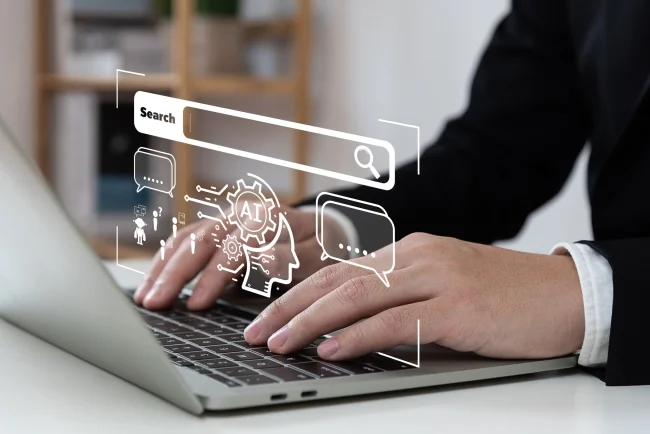How Student-Athletes Can Use AI to Improve Their Job Search and Career Development

As technology continues to reshape the job market, AI (artificial intelligence) is becoming an essential tool for job seekers across all industries. For student-athletes preparing to transition from sports to the workforce, understanding how to leverage AI can give them a competitive edge. From streamlining the job search process to enhancing career development, AI is making it easier for student-athletes to stand out in a crowded job market. Here’s how they can use AI to their advantage:
1. Optimizing Resumes with AI-Powered Tools
One of the first steps in any job search is creating an impactful resume. However, a great resume is not just about listing experiences; it’s about presenting those experiences in a way that aligns with what employers are looking for. AI tools like Jobscan or Resumake can help student-athletes optimize their resumes by analyzing job descriptions and suggesting changes to increase their chances of passing through Applicant Tracking Systems (ATS).
By using AI, student-athletes can identify key phrases, skills, and keywords that employers are searching for, tailoring their resumes to match each job posting. AI also helps highlight transferable skills gained through sports, such as leadership, teamwork, and time management, which are critical for almost every job.
2. Networking and Job Searching with AI Tools
Networking is one of the most effective ways to land a job, and AI-powered platforms like LinkedIn and BluChip Scout can automate and streamline the process. With tools like BluChip Scout, student-athletes can automate their LinkedIn connection requests, follow-up messages, and outreach campaigns to potential employers, hiring managers, and industry professionals.
AI also helps optimize networking efforts by identifying the best prospects based on job titles, location, and other filters, ensuring that student-athletes spend their time reaching out to the right people. Automated scheduling tools like Calendly powered by AI can also help coordinate networking meetings without the hassle of back-and-forth emails.
3. Personalized Job Matching
Student-athletes can use AI-driven platforms to receive personalized job recommendations based on their skills, experience, and preferences. Websites like LinkedIn and Glassdoor use machine learning algorithms to match users with job listings that align with their profile. These platforms consider factors such as job titles, industries, skills, and even past experiences to recommend the most relevant opportunities for job seekers.
For student-athletes, personalized job matching helps them identify roles that leverage their athletic skills and experiences, even if the job market is competitive. AI-driven job-matching technology can help them find opportunities they may not have otherwise considered, allowing them to broaden their career options.
4. Preparing for Interviews with AI-Powered Tools
AI is also transforming the way candidates prepare for job interviews. Platforms like Interviewing.com or HireVue allow student-athletes to practice their interview skills using AI-powered simulations. These platforms analyze how candidates respond to interview questions, providing feedback on things like tone, word choice, and body language.
This is especially useful for student-athletes who may be new to the job search process or who are transitioning from a highly structured sports environment to the more flexible and dynamic world of business. By practicing their interview skills with AI, they can gain confidence, refine their answers, and increase their chances of performing well in real interviews.
5. Continuous Career Development with AI
AI isn’t just useful during the job search process—it can also help student-athletes grow and develop throughout their careers. AI-powered career coaching platforms like PathSource or Pymetrics provide personalized development recommendations based on an individual’s skills, goals, and performance. These platforms offer suggestions for skill development, online courses, and certifications that can help student-athletes advance in their chosen career path.
In addition, AI-driven learning platforms like LinkedIn Learning or Coursera recommend courses that can help student-athletes build new skills in areas like business, communication, and leadership—skills that are highly valued in the workplace. By using AI for career development, student-athletes can continue to enhance their qualifications and stay ahead of the curve.
6. Analyzing Job Market Trends and Salary Expectations
AI tools can also help student-athletes understand the broader job market and salary trends, providing valuable insights into which industries are growing and what skills are in high demand. Websites like Glassdoor, PayScale, and Indeed use AI to analyze job postings, salary data, and market trends, helping student-athletes understand what they can expect in terms of compensation, job responsibilities, and growth potential.
This information is crucial for student-athletes making decisions about which career paths to pursue, and it can help them negotiate better salaries and benefits when they receive job offers.
7. Using AI for Personalized Career Advice
AI platforms like BluChip Scout and Candidly provide personalized career advice based on student-athletes’ goals, experiences, and industries of interest. These platforms use data-driven insights to provide tailored recommendations for job seekers, such as which companies to target, which skills to develop, and how to improve job applications. By utilizing AI-powered career coaching, student-athletes can gain clarity on their next steps and make more informed decisions as they transition to the workforce.
AI is revolutionizing how student-athletes approach their job search and career development. By embracing AI-powered tools, they can streamline the job application process, optimize their resumes, enhance their networking efforts, and prepare for interviews more effectively. With AI’s help, student-athletes can tap into their full potential, gaining an edge in a competitive job market while making the most of their unique experiences and skills.

